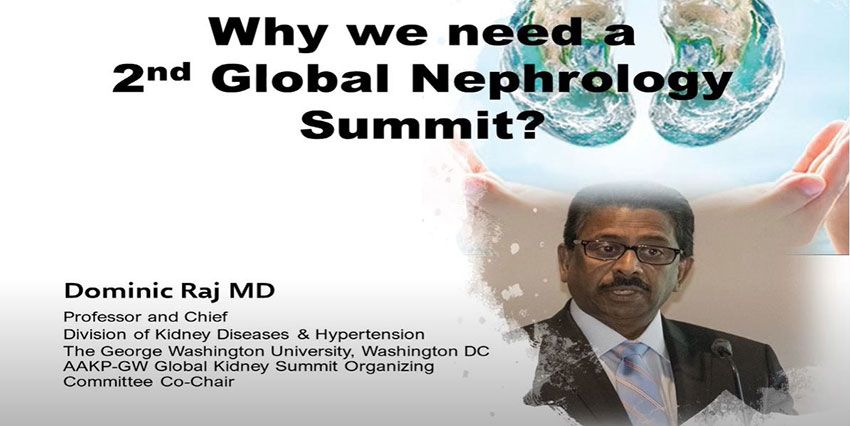
For the second consecutive year, the Global Kidney Summit co-hosted by the American Association of Kidney Patients (AAKP) and the George Washington University School of Medicine and Health Sciences (SMHS), provided an international audience of patients and health care professionals with information on the latest developments and trends around patient care, especially in relation to the COVID-19 pandemic.
The two-day conference featured presentations on topics that included the impact of the virus on kidneys and on kidney patients, as well as innovations in kidney care, new research into kidney disease, novel therapies in transplantation, and advancements in home dialysis care.
In welcoming remarks to summit participants, Barbara L. Bass, MD, RESD ’86, vice president for health affairs, dean of SMHS, and CEO of The GW Medical Faculty Associates, noted the difference in this year’s conference format.
“We are now online, but it’s a change that I know will not diminish the energy of those who’ve gathered for this important conference,” she remarked. “We have had an overwhelming response from participants, and I welcome everyone who has joined us for these conversations.”
Richard Knight, president of AAK, and Paul T. Conway, AAKP chair of Policy & Global Affairs and the co-chair for the summit, welcomed the audience and called for more patient engagement and need for global policies to address the epidemic of kidney disease. During the Global Summit, AAKP announced a strategic partnership with the Renal Patient Support Group (RPSG), a United Kingdom international evidence-based patient group.
In addition, Griffin P. Rodgers, MD, MACP, Director, National Institute of Diabetes and Digestive and Kidney Diseases (NIDDK) highlighted new kidney research initiatives launched by the NIDDK.
Dominic Raj, MD, DM, FACP, FASN, professor of medicine and chief of the Division of Kidney Diseases and Hypertension at SMHS and summit co-chair, noted how the pandemic arrived swiftly, causing changes in care for patients, as well as changes to the summit.
“We considered canceling the summit … [but] we decided to use this opportunity to address the relevance of COVID-19 to the kidney community,” he said. “Kidney patients are more susceptible to COVID-19 because of the thrice-weekly need for in-center dialysis and the immunosuppressed state of transplant patients.”
Another presentation, Kidney Community Response to COVID Pandemic, was given by Alan Kliger, MD, clinical professor of medicine at the Yale University School of Medicine and the chair for Nephrologists Transforming Dialysis Safety, and Emily Blumberg, MD, transplant infectious diseases specialist at the University of Pennsylvania and immediate past-president of the American Society of Transplantation.
Attendees also heard from Jonathan Himmelfarb, MD, co-director of the Center for Dialysis Innovation and director of the Kidney Research Institute at the University of Washington. Himmelfarb’s presentation focused on the Kidney Precision Medicine Project, which aims to develop treatments tailored to each patient’s specific needs. The project is directed toward acute kidney injury (AKI) patients or patients suffering from chronic kidney disease (CKD).
Claudio Ronco, MD, director of the Departments of Nephrology and Dialysis and Transplantation at the International Renal Research Institute at St. Bortolo Hospital in Vicenza, Italy, discussed the prevalence and management of COVID-19 associated acute kidney injury.
The first day of the summit also featured sessions on kidney disease clinical trials and diabetic kidney disease, and many other topics.
Technology was one of the topics du jour of the event’s second day, with Neal Sikka, MD, co-chief of the Section of Innovative Practice and professor of emergency medicine at SMHS, discussing the effect of virtual health care on care of kidney patients amid the COVID-19 pandemic, and the return to in-person care. Sikka spoke to the work across the GW medical enterprise to help patients suffering from kidney disease and at risk of serious illness from COVID-19.
Efforts included piloting citywide protocols that enabled EMTs and paramedics to collect nasopharyngeal swabs from COVID testing and administer vaccines. “This type of scope of practice did not exist in our city’s existing EMS protocols and our emergency response leadership was incredibly supportive in piloting early and aggressive responses to COVID.”
In addition, to preserve personal protective equipment, Sikka said they turned to virtual visits. They used video to limit the number of people in the room with the patient, as well as to facilitate education, allowing students to watch physician-patient interaction. He said they also saw patients diagnosed with COVID-19 return back to the emergency department with worsening symptoms.
“In response, we launched a remote monitoring program and were able to discharge patients home with medical devices and have them report their symptoms on a daily basis.” Sikka added that while some of these patients needed to return to the hospital, a large number of them were able to manage their symptoms and care remotely.
Later in the day, attendees heard from Ashte Collins, MD, assistant professor of medicine at SMHS and director of the Home Dialysis Program at GW, about the global need to support the growing home dialysis community, as well as on topics including observations of health care systems responses to the pandemic and emerging innovations in kidney disease.
In addition, Murray Sheldon, MD, associate director for technology and innovations in the Center for Devices and Radiological Health at the U.S. Food and Drug Administration called for international collaboration to advance kidney care.
Other notable topics at the summit included bioartificial kidney, nanomedicine, cell-free DNA, and artificial intelligence in optimizing kidney transplant care.
By the end of the summit, almost 3,000 patients, caregivers, and medical professionals, hailing from 75 countries, including Argentina, Ireland, Australia, Nepal, India, Saudi Arabia, and Bangladesh, tuned in to the many sessions.


